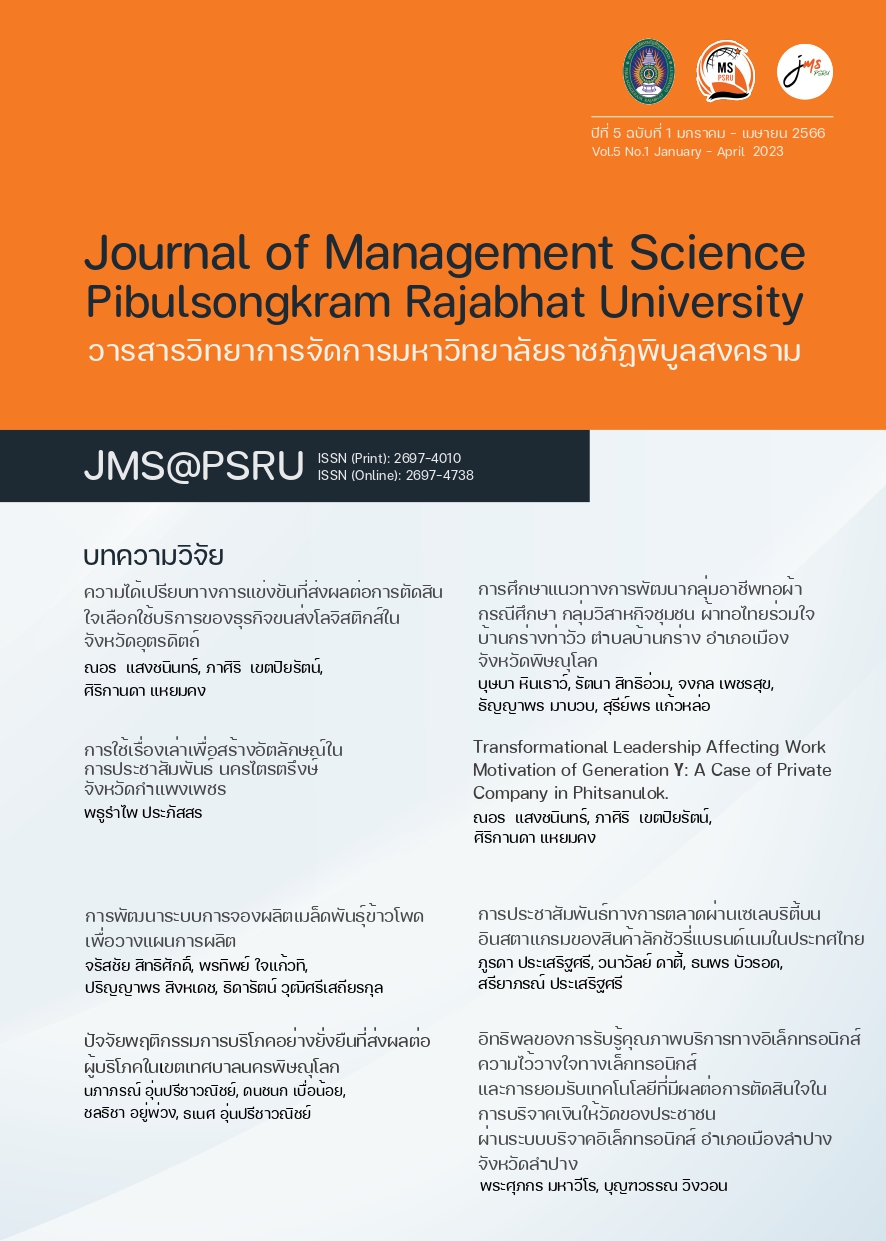Transformational Leadership Affecting Work Motivation of Generation Y: A Case of Private Company in Phitsanulok
คำสำคัญ:
Transformational Leadership, Work Motivation, Generation Yบทคัดย่อ
This research aims to study factors of transformational leadership affecting the work motivation of Generation Ys in Phitsanulok Province, Thailand. Data were collected by 350 working Generation Y employees (from year 1981 to 1995) at private companies in Phitsanulok province, located in the lower northern part of Thailand, with a significance level of 0.05. The data were analyzed by using descriptive statistics which are frequency and percentage, mean, and standard deviation, and inferential statistics which are ANOVA, Correlation and regression analysis were applied to analyze a relationship and influential affect among the variables. The results found that transformational leadership positively influences work motivation of Generation Y employees. Organization and top management are required to set the policy and strategy to cope with Generation gap with attention for the organization reputation in the long run which leads to the sustainability.
เอกสารอ้างอิง
Bass, B. M. (1990). From transactional to transformational leadership: Learning to share the vision. Organizational Dynamics, 18(3), 19–31. https://doi.org/10.1016/0090-2616(90)90061-S
Bass, B. M., & Avolio, B. J. (1993). Transformational leadership and organizational culture. Public Administration Quarterly, 112-121.
Cetin, M. O., & Kinik, F. S. F. (2015). An analysis of academic leadership behavior from the perspective of transformational leadership. Procedia-Social and Behavioral Sciences, 207, 519-527.
Charoenkul, W. (2020). Teacher’s job motivation of Banyangsoong School (Master Thesis). Bangkok: Silpakorn University.
Cochran, W.G. (2007). Sampling Techniques. John Wiley & Sons, Hoboken.
Hayati, D., Charkhabi, M., & Naami, A. (2014). The relationship between transformational leadership and work engagement in governmental hospitals nurses: a survey study. Springerplus, 3(1), 1-7.
Herzberg, F., Mausner, B., & Synderman, B. (1959). The motivation to work. New York: Wiley
Jangsiriwattana, T. (2019). The relationship between transformational and transactional leadership: Employee perceptions of organizational performance and work engagement. Journal of the International Academy for Case Studies, 25(3), 1-10.
Kian, T. S., & Yusoff, W. F. W. (2012). Generation X and Y and their work motivation. Proceedings International Conference of Technology Management, Business and Entrepreneurship, (p.396-407). Malaysia: Melaka.
Kupperschmidt, B. R. (2000). Multigenerational employees: strategies for effective management. The Health Care Manager, 19(1), 65-76.
Leventhal, G. S. (1980). What should be done with equity theory?. In Social exchange
(p. 27-55). United States of America: Boston.
Mansor, Z. D., Mun, C. P., Farhana, B. N., & Tarmizi, W. A. N. (2017). Influence of transformation leadership style on employee engagement among Generation Y. International Journal of Social, Behavioral, Educational, Economic, Business and Industrial Engineering, 11(1), 161-165.
Mushinsky, P. M. (1997). Psychology applied to work an introduction to industrial and organizational psychology. California: Brooks/Cole.
Northouse, P. (2016). Leadership Theory and Practice. Los Angeles: Sage Publications Inc.
Otieno, C. D., Linge, T., & Sikalieh, D. (2019). Influence of intellectual stimulation on employee engagement in parastatals in the energy sector in Kenya. International Journal of Research in Business and Social Science, 8(6), 148-161. https://doi.org/10.20525/ijrbs.v8i6.506
Pancasila, I., Haryono, S., & Sulistyo, B. A. (2020). Effects of work motivation and leadership toward work satisfaction and employee performance: Evidence from Indonesia. The Journal of Asian Finance, Economics and Business, 7(6), 387-397. https://doi.org/10.13106/jafeb.2020
Pappas, C. (2016). 8 Important Characteristics of baby boomers eLearning professionals should know. E-Learning Industry. Retrieved March 21, 2022, from https://elearningindustry.com/8-importantcharacteristics-baby-boomers-elearning-professionals-know.
Pew Research Center Analysis. (2018). Millennials are the largest generation in the U.S. labor force. Retrieved March 21, 2022, from https://www.pewresearch.org/fact-tank/2018/04/11/millennials-largest-generation-us-labor-force/
Seemiller, C., & Grace, M. (2016). Generation z goes to college. San Francisco, CA: Jossey-Bass.
Setiono, B., Pangaribuan, C. H., & Meilani, A. W. (2019). The role of transformational leadership style in developing employee engagement among generation Y in Jakarta. International Journal of Research Science & Management, 6(3), 1-12. https://doi.org/10.5281/zenodo.2587516
Srinivasan, V. (2012). Multi generations in the workforce: Building collaboration. IIMB Management Review, 24, 48-66.
Srisaard, B. (2002). Introduction Research. Bangkok: Suveriyasarn.
Strauss, W., & Howe, N. (1991). Generations: The history of America's future, 1584 to 2069 (Vol. 544). New York: Quill.
Sundaray, B. K. (2011). Employee engagement: A driver of organization effectives. European Journal of Business and Management, 3(8), 53-59.
Susilo, D. (2018). Transformational leadership: A style of motivating employees. Management and Economics Journal, 3(1), 125-132. https://doi.org/10.18860/mec-j.v0i1.5222
Tolbize, A. (2008). Generational differences in the workplace. Research and Training Center on Community Living. University of Minnesota: USA.
Twenge, J. M., Campbell, S. M., Hoffman, B. J., & Lance, C. E. (2010). Generational differences in work values: Leisure and extrinsic values increasing, social and intrinsic values decreasing. Journal of Management, 36(5), 1117-1142. https://doi.org/10.1177/0149206309352246
Vanichbuncha. K. (2007). Statistical analysis: Statistics for management and research. (10th ed). Bangkok: Chulalongkorn University Press.
Wuttaphan, N. (2018). Diversity Management: When Generation Z comes to the Workplace and How Human Resources Can manage?. Paper presented at the 7th Business, Economics and Communications International Conference 2018, November 29th-30th, 2018, (p 51-59). Phitsanulok: Naresuan University.
ดาวน์โหลด
เผยแพร่แล้ว
เวอร์ชัน
- 2023-06-24 (2)
- 2023-03-17 (1)
รูปแบบการอ้างอิง
ฉบับ
ประเภทบทความ
สัญญาอนุญาต
ลิขสิทธิ์ (c) 2023 มหาวิทยาลัยราชภัฎพิบูลสงคราม

อนุญาตภายใต้เงื่อนไข Creative Commons Attribution-NonCommercial-NoDerivatives 4.0 International License.
บทความที่ได้รับการตีพิมพ์ในวารสารวิทยาการจัดการมหาวิทยาลัยราชภัฏพิบูลสงคราม เป็นลิขสิทธิ์ของ คณะวิทยาการจัดการ มหาวิทยาลัยราชภัฎพิบูลสงคราม บทความที่ลงพิมพ์ใน วารสารวิทยาการจัดการมหาวิทยาลัยราชภัฎพิบูลสงคราม ถือว่าเป็นความเห็นส่วนตัวของผู้เขียน คณะบรรณาธิการไม่จำเป็นต้องเห็นด้วย ผู้เขียนต้องรับผิดชอบต่อบทความของตนเอง


